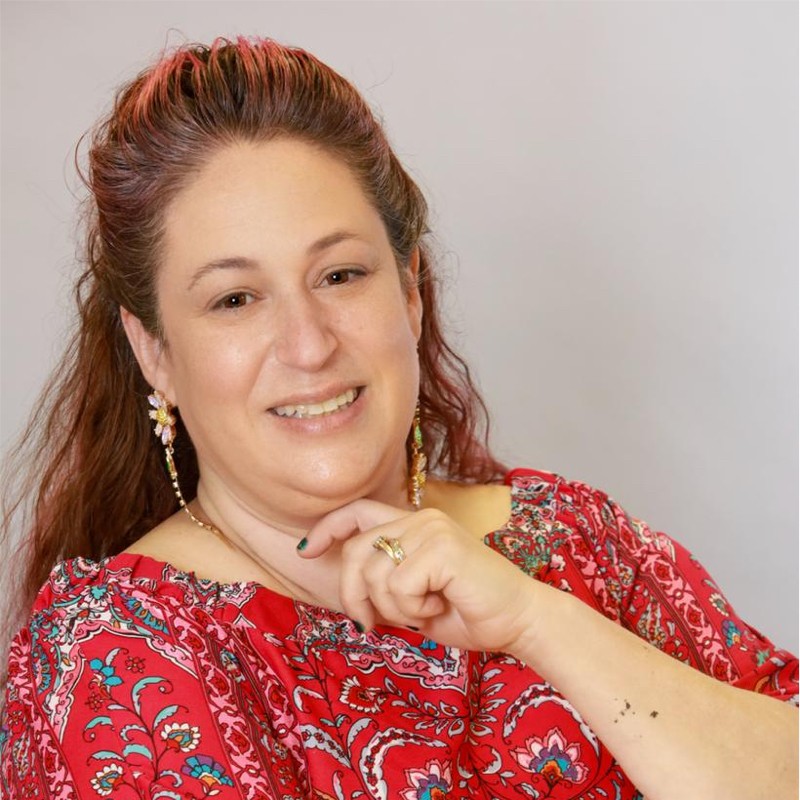Why I Feel Safest at Work: Fear, Exhaustion and the Power of ‘Just Googling It’
Share this pageI have been staring at a blank page for hours. This article is days late and while I feel bad for missing a deadline, in truth I am struggling. I am struggling to write a tactical article about diversity, equity, inclusion, and accessibility (DEIA) work, primarily because I am in pain. I’m in pain because for the last several days, in multiple facets of my life, I have been asked to explain why there is so much antisemitism.
Like a groundhog’s day marathon, individuals I know and don’t know alike are approaching me and asking why people around the world, for centuries, have hated me and my ancestors. People are literally asking me to present an argument about why I should be hated. As a teacher, social justice worker, and DEIA practitioner, I acknowledge that I have willfully and purposefully chosen to be a resource for others. Thus, I do not have the right to turn away individuals seeking to learn. But truth be told, on days like today, all I really want to do is yell at the top of my lungs: “Google it!”
Two days prior to writing this article, cities across the country were on full alert following police warnings of an uptick in ‘domestic violent extremist messaging,’ from neo-Nazi and white supremacist groups who organized a ‘National Day of Hate.’ While few actions were reported, the threats alone are a form of psychological terrorism. As an American Jew, there’s an inescapable sense that I’m always waiting and preparing for the daily identity-aggressions to turn into full-fledged mob violence. And I am not alone in this feeling.
According to a study by American Jewish Committee (AJC) that was released just a few weeks ago, 82% of the individuals who share this portion of my identity feel less safe in America today than they did five years ago. However, one place where I do feel safe is my place of employment. That’s because ANCOR has worked hard to create a culture of curiosity, a commitment to do no harm, and a community of allies and accomplices.
One of the things I love about ANCOR is that we are a community of learners. In 2022, the staff adopted a goal to begin the work of intersectional collaboration by deepening our individual and collective understanding of systemic oppression experienced by people from marginalized and underrepresented communities. To achieve this goal, we have embraced problem-posing as a key strategy for learning. Problem-posing emphasizes the active creation of knowledge and encourages the learner to generate their own questions and to embrace their own curiosity rather than simply waiting for the delivery of information.
This approach challenges us to deepen our critical thinking skills, value our creativity, and actively work to find solutions to real world problems. It started with one employee’s desire to read pivotal Black texts, which generated a highly participatory and voluntary book club. We continued to feed our desire to want to know more with a weekly newsletter called “Notes for Growth,” which has developed to include dedicated sections not only to important upcoming holidays and celebrations, but also to weekly thematic readings and resources that staff can peruse at their leisure. We also have a dedicated Slack channel where interesting and compelling articles can be dropped for “water cooler” conversations. We email each other resources when we think a particular staff member might be interested in something new we have discovered. We regularly sign up for webinars and trainings just because we find the topics interesting and want to learn more.
And, crucially, we also acknowledge that there is too much to know and that no one person can be the possessor of all information. Thus, we are each encouraged to follow our passions so that our combined knowledge can make us all better. It’s this continual pursuit for knowledge that makes me feel safe. The more we know, the harder it becomes to make sweeping generalizations and to fall into the trap of the single story.
As ANCOR’s Director of Education and Intersectional Collaboration, it’s my job to develop our webinar content. Among our many offerings, we have started to host what I call “critical conversations.” If you have participated in one of these sessions – Getting Real about Racism in the Workplace: A Conversation about Racial Fatigue and Black & Brown Burnout or No, I Won’t Calm Down: A Conversations about Tone Policing in the Workplace – you know that we set ground rules for engagement. One of those ground rules is, “if you can Google it, don’t ask it.” This ground rule is designed to acknowledge that we are asking panelists to share their lived experiences, and that in sharing they are empowering us through their vulnerability. As the moderator, it’s my job to make the space as safe as possible, because if we have the ability to prevent harm, we should.
Within any organization there are individuals who are part of rising identities that are willing to help you learn, but on their own terms. When a female-identifying colleague shares her struggles finding a health care provider that will listen, when an Asian colleague shares information about their preparation for the Lunar New Year, or when Gen Z employees share their struggles with student loan debt, listen. If they are having this conversation in front of you, it’s a sign of trust – trust that you are willing to receive what they are sharing.
However, sometimes the expectation of sharing can cause unnecessary harm. Not every member of every underrepresented minority group is, or needs to be, an expert educator. My knowledge about Judaism has become substantially more robust because often I am the only Jew in the room. The pressure to speak on behalf of approximately eight million American Jews is beyond overwhelming. I am ethnically Ashkenazi. I do not represent, nor do I know the culture of those who are Sephardim, Mizrahi or Ethiopian. Yiddish words are part of my vernacular, but I don’t know Hebrew, Ladino or Farsi. I grew up in a secular home and while I have become religious, and at one point considered becoming a rabbi, I cannot begin to tell you whether I believe in the conservative, reform, reconstructionist, or any other of the countless modern movements.
Just because I am Jewish does not mean I fully support the Israeli government any more than I may or may not support the efforts of our country’s current administration or Congress. Yet, often as the only Jewish person in the room, I am deemed the subject matter expert. And because I believe that spreading knowledge increases my safety, I have educated myself as much as I can because I fear what people will learn when they look elsewhere.
But opening myself up to these questions is hard because with every simple question comes the hard ones – ones asked with genuine curiosity, but ones that cause equally genuine pain. Why do people hate you? Why did you kill Jesus? A Google search of “why do people hate Jews” yields approximately 114,000,000 results in 0.49 seconds, with top responses coming from the Southern Poverty Law Center, the American Jewish Committee, and the Anti-Defamation League (ADL). A Google search of “why did Jews kill Jesus” results in 35,100,000 results in 0.37 seconds with top results from either the ADL or Pope Benedict XVI (take your pick) that explain that there is no basis in scripture for the belief that the Jewish people were responsible for the death of Jesus.
The point is that in less than a second, humans can access numerous credible sources to fulfill their curiosity without causing additional emotional trauma. Because I know that my colleagues value impact over intent, I can safely head into work knowing that their curiosity will be tempered by a do-no-harm attitude. I will not have to answer questions that seek to deny me my humanity – because they know they can Google it.
Finally, despite the fact that I help steer ANCOR’s DEIA work, it does not mean that our work is siloed, nor that I hold the sole responsibility to move our efforts forward. It is a truly collective effort, which means that when I don’t feel safe, I don’t have to participate. Later today, for example, we will start our study of Stephanie Pinder-Amaker and Lauren Wadsworth’s 2021 book entitled Did That Just Happen?! Beyond “Diversity”: Creating Sustainable and Inclusive Organizations. Unlike our voluntary book club, this “culture circle” requires attendance, as well as collaborative leadership (each staff member is required to facilitate a chapter discussion on a topic of their choice) and active engagement. The scenarios are real, but the format is designed not to place value judgments. Instead, the work is focused on problem-posing and the generation of proactive solutions.
However, later this week is our book club, and even though I am our recognized in-house DEIA practitioner, I won’t be attending. The group chose to read Caste: The Origins of Our Discontents by Isabel Wilkerson. It is an incredible read and a foundational text that shapes the work we do, and seek to do. However, a large part of this text digs into the Jewish experience. There is a lot of information that people will be processing for the first time. They need to talk, to discuss, and to do their own learning – but I don’t. I am the lineage of pogrom survivors. In my family photo albums, I carry pictures of loved ones lost in the Holocaust. I personally carry the physical and emotional scars of antisemitism in the United States. And all of it, in this moment, is just too much.
But I am so so so lucky. For the first time in my life, I don’t have to lead to ensure that my people’s trauma and lived experiences are valued. I have not just an ally, but several accomplices in the space who are ready to lead – who understand and are willing to carry the load so that I don’t have to endure more emotional labor in this moment for the greater good.
So, folks, this is the business case. The safest place I feel right now is my place of employment. As a result, I am not sure I will ever want to leave. What we have at ANCOR is rare. So while we aren’t perfect and, like all organizations, we have more work to do, ANCOR has gained my loyalty. It has gained my loyalty as an employee because we have created a rare culture of curiosity, a commitment to do no harm, and a community of allies and accomplices where I feel seen, heard, and valued – and in times like these, the impact is immeasurable.
Stay Informed on the Latest Research & Analysis from ANCOR
More News
ANCOR Joins Coalition Letter to Senate to Support Expanded Access to Medicaid Buy-In Programs

Voices of Diversity Webinar Series Announces First Webinar
Stateside Report: November 04, 2024


